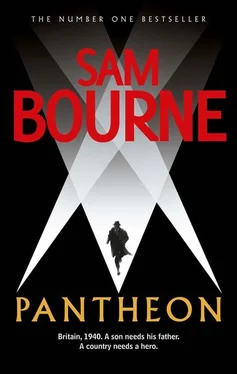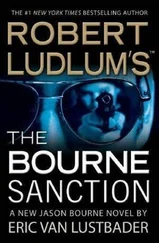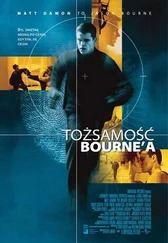Sam Bourne - Pantheon
Здесь есть возможность читать онлайн «Sam Bourne - Pantheon» — ознакомительный отрывок электронной книги совершенно бесплатно, а после прочтения отрывка купить полную версию. В некоторых случаях можно слушать аудио, скачать через торрент в формате fb2 и присутствует краткое содержание. Жанр: Триллер, на английском языке. Описание произведения, (предисловие) а так же отзывы посетителей доступны на портале библиотеки ЛибКат.
- Название:Pantheon
- Автор:
- Жанр:
- Год:неизвестен
- ISBN:нет данных
- Рейтинг книги:3 / 5. Голосов: 1
-
Избранное:Добавить в избранное
- Отзывы:
-
Ваша оценка:
- 60
- 1
- 2
- 3
- 4
- 5
Pantheon: краткое содержание, описание и аннотация
Предлагаем к чтению аннотацию, описание, краткое содержание или предисловие (зависит от того, что написал сам автор книги «Pantheon»). Если вы не нашли необходимую информацию о книге — напишите в комментариях, мы постараемся отыскать её.
Pantheon — читать онлайн ознакомительный отрывок
Ниже представлен текст книги, разбитый по страницам. Система сохранения места последней прочитанной страницы, позволяет с удобством читать онлайн бесплатно книгу «Pantheon», без необходимости каждый раз заново искать на чём Вы остановились. Поставьте закладку, и сможете в любой момент перейти на страницу, на которой закончили чтение.
Интервал:
Закладка:
He felt it now as he walked across Grosvenor Square, his bag once again weighty with illicit cargo. He had staged this heist with much greater sophistication than his little trick at the expense of the St Albans senior year. He had had to use his hands — switching papers from one pile to another with the panache of a magician producing the ace of spades from a handkerchief — but also his wits.
He had created a distraction, summoning his colleagues to huddle over an intriguing cipher that had just come in, asking them to pool their collective knowledge to work out what it could possibly mean. And, while they were puzzling over it, Cellucci scratching his ear with the eraser-end of his pencil, Taylor had salted away carbon copies of the key papers right there and then, inches away from their very eyes.
That, he complimented himself now, was the genius of it. At the moment he had chosen to strike, he had not ushered the dullards of the cipher room out and away. No, no, no. Nor had he done anything so cheap or pedestrian as wait for them to leave. On the contrary, he had beckoned his fellow decoders over to his very desk. As they gathered in a knot around the bait he had laid for them, he had taken one pace back before calmly and quietly taking exactly what he wanted. He had turned potential witnesses to his crime into alibis for his innocence.
As he walked back through Hyde Park on this bright summer evening, he felt the blood rush to his loins. He was hardening at the thought of what he had done. He pictured himself with Anna, looking at the papers together, tonight, in bed. He would read them out loud, impersonating the authors’ voices. He imagined her praising him, calling him ‘her clever little boy’, rewarding him with her tongue, starting at his chest and working steadily downward…
Or perhaps he would forego that particular delight, exquisite though he knew it would be. Perhaps he would show restraint and wait for the greater prize. It would mean going straight home now, stashing these documents where they would never be found — until he was ready to show them to the man who would understand their true power. The man, indeed, who had already entrusted him with his own great secrets, held together between the covers of the magnificent Red Book. Imagine what Rawls Murray could do with these papers. He would be overawed the instant he saw who had written them — but once he had digested their substance, well, he would fall to his knees.
Taylor Hastings would become an instant hero to Reginald Rawls Murray, that much was obvious. He would, of course, be a hero to the Right Club. But the young American dared dream of a greater accolade still. By his actions he, Taylor Hastings, would become nothing less than a hero to history.
Chapter Thirty-five
Eugenics? James squinted at the sign to make sure he had read it properly. Eugenics? How on earth did the science of human breeding — improving the quality of the human race and all that that implied — fit into everything that had happened these last few days and weeks? Unless, of course, it didn’t. Unless he had simply followed a random member of the Wolf’s Head Society with a scholarly interest in eugenic ideas and no connection at all to Lund, the Dean and his niece or, crucially, Florence and Harry…
Reason told him to walk away and to think again. And yet he had learned since that early morning in Oxford that reason did not always deserve the last word, that there was more to him than the power to add up logical propositions, one following another. He was made of flesh and blood, with instincts and intuitions — as well as rages and sorrows — that he had tried to deny for too long. And so he listened to his gut as it told him to ring the doorbell and attempt to get inside the New Haven branch of the American Eugenics Society.
He did not have to wait long. A bespectacled man, his glasses misting up in the heat of this last day of July, answered the door. Judging from his expression, and the sound of voices coming from within, he had been letting people in for a while: it seemed a meeting was underway.
Once again, instinct intervened. Instead of offering his name, James simply nodded and stepped forward.
‘Are you on our list?’ asked the man with the foggy glasses.
‘I should be,’ James said, in what he hoped was a tone that was part supreme confidence, part lightness and affability. The man on the door pointed James towards a table where two women were taking names. James thanked him and headed in that direction, only to drift away the instant the bell rang, summoning the sweating man on the door back to his duties.
The interior was cool and bright, like a London townhouse. He was standing in the hall on a floor made of stone tiles of black and white, like a diamond-shaped chessboard. Off it he could see a meeting room, the door open, the chairs already set out in rows in a fashion that recalled similar sessions at Oxford. This, he guessed, was that peculiar creature, the early-evening seminar: glass of wine, a show-off presentation, more show-off discussion.
He milled around, noting a crowd that looked utterly familiar: men, most of them middle-aged, in the crumpled linens and tortoiseshell spectacles of the academic. He avoided eye contact, fearing to be drawn into a conversation that might require him to explain himself. Instead, he chose to linger by one of the display tables covered with material relating to tonight’s talk. The title was ‘Eugenics, the next steps’ and the speaker was a Dr William Curtis of Yale Medical School. Was he another of McAndrew’s proteges?
Also on the table was a neatly-stacked pile of copies of a thin red volume which James took to be a kind of manifesto for the society, apparently offered free of charge. All true believers did this, James had noticed: communists giving away Marxist texts, evangelicals handing out bibles to passers-by. He wondered if this would be a scholarly seminar or an exercise in evangelism.
He picked up the book and saw that it was, in fact, a primer on the topic: What is Eugenics? by Major Leonard Darwin. The book did not mention what James already knew: that this Darwin was the son of Charles.
Not that he knew much more than that. He had long been aware of eugenics; it would be impossible to be an educated man in the 1930s and not be aware of it. There had been a Eugenics Society at Oxford, though whether it was still in business he would be hard pressed to say. There was the occasional lecture on the topic as well as frequent letters and articles in the periodicals. And yet James had let it pass him by. The language of the subject did not appeal to him and its leading advocates he found especially grating: so often well-born, busybody types all too ready to condescend to a scholarship boy from the provinces.
Now James ran his eye over the contents page of the junior Darwin’s book, picking out the chapter headings. Domestic Animals; Hereditary Qualities; The Men we Want; Inferior Stocks; Birth Control; Sterilization; Feeble-Mindedness; The Deterioration of our Breed, Eugenics in the Future; Selection in Marriage.
He glanced up to see that the room was filling up and for a while he eavesdropped on the greetings and handshakes taking place around him, with their talk of delayed trains from Boston and long drives from New York. This was, James understood, a meeting of scholars from beyond Yale, one that appeared to bring together colleagues from several Ivy League universities: Harvard, Princeton, Columbia and the like. When James sensed that someone was looking in his direction, he quickly ducked back to the book, reading the first line of the first page:
When the time comes for the old dog to die and when with sorrow we shall have to replace him, will not the breed of our new companion be our first thought?
Читать дальшеИнтервал:
Закладка:
Похожие книги на «Pantheon»
Представляем Вашему вниманию похожие книги на «Pantheon» списком для выбора. Мы отобрали схожую по названию и смыслу литературу в надежде предоставить читателям больше вариантов отыскать новые, интересные, ещё непрочитанные произведения.
Обсуждение, отзывы о книге «Pantheon» и просто собственные мнения читателей. Оставьте ваши комментарии, напишите, что Вы думаете о произведении, его смысле или главных героях. Укажите что конкретно понравилось, а что нет, и почему Вы так считаете.












